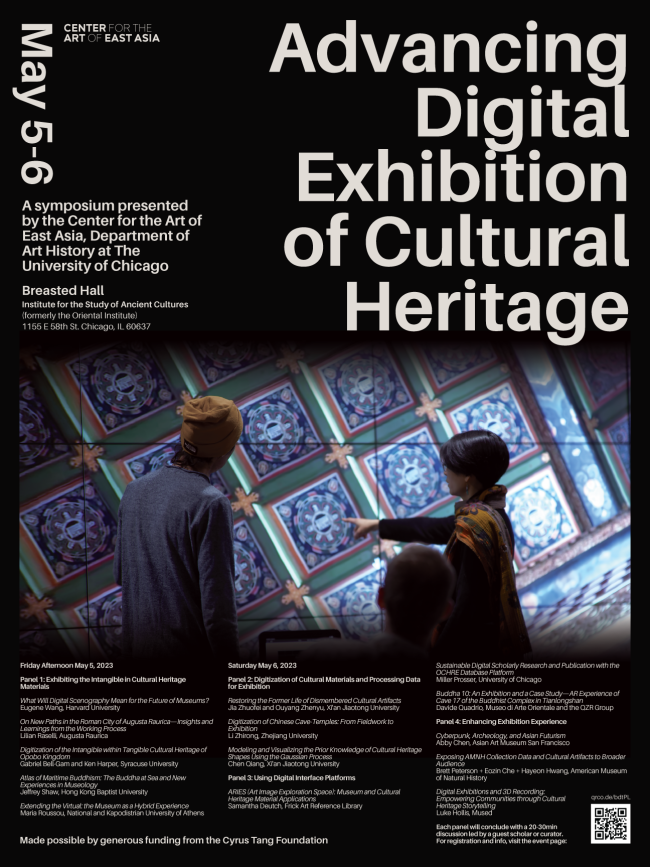Advancing Digital Exhibition of Cultural Heritage

Advancing Digital Exhibition of Cultural Heritage
Hosted by the Center for the Art of East Asia, Department of Art History, University of Chicago
Dates:
Friday-Saturday, May 5-6, 2023 (Time: from Friday afternoon to Saturday all day)
Location:
The Institute for the Study of Ancient Cultures (formerly Oriental Institute) Breasted Hall: 1155 E 58th St. Chicago, IL 60637
Event Description:
The Center for the Art of East Asia in the Department of Art History at the University of Chicago brings together art historians, museum curators, archaeologists, academic scholars, and technologists to provide insights into digital applications for exhibiting research data on the cultural heritage of East Asia and beyond. Through project-based presentations and panel discussions, the event aims to present information and methodologies and to discuss the current state and advancements of digital exhibition and engagement practices. We hope to promote and stimulate this important developing area in the use of digital technologies for humanities and social sciences knowledge production and education.
The event will be held in person and is free and open to the public. Registration is strongly recommended to ensure seating.
Schedule: (as of April 27)
[DAY 1] Friday May 5, 2023, 1:00 - 5:10 PM CST
1:00 - 1:25 PM
Welcome & Opening Remarks
by Professor Wu Hung, Harrie A. Vanderstappen Distinguished Service Professor of Art History and the College & Director of the Center for the Art of East Asia, Dr. Katherine Tsiang, Associate Director of the Center for the Art of East Asia, and Professor Wei-Cheng Lin, Associate Professor of Art History and the College
1:25 - 5:05 PM
Panel 1: Exhibiting the Intangible in Cultural Heritage Materials
- What Will Digital Scenography Mean for the Future of Museums? (Eugene Wang, Harvard University)
- On New Paths in the Roman City of Augusta Raurica—Insights and Learnings from the Working Process (Lilian Raselli, Augusta Raurica)
- Digitization of the Intangible within Tangible Cultural Heritage of Opobo Kingdom (Gabriel Bell-Gam and Ken Harper, Syracuse University)
- Atlas of Maritime Buddhism: The Buddha at Sea and New Experiences in Museology (Jeffrey Shaw, Hong Kong Baptist University)
- Extending the Virtual: the Museum as a Hybrid Experience (Maria Roussou, National and Kapodistrian University of Athens)
5:05 - 5:10 PM
Final Remarks
[DAY 2] Saturday May 6, 2023, 8:30AM - 4:45PM CST
8:30 - 10:40 AM
Panel 2: Digitization of Cultural Materials and Processing Data for Exhibition
- Restoring the Former Life of Dismembered Cultural Artifacts (Jia Zhuofei and Ouyang Zhenyu, Xi'an Jiaotong University)
- Digitization of Chinese Cave-Temples: From Fieldwork to Exhibition (Li Zhirong, Zhejiang University)
- Modeling and Visualizing the Prior Knowledge of Cultural Heritage Shapes Using the Gaussian Process (Chen Qiang, Xi'an Jiaotong University)
10:55 AM - 12:05 PM
Panel 3: Using Digital Interface Platforms
- ARIES (Art Image Exploration Space): Museum and Cultural Heritage Material Applications (Samantha Deutch, Frick Art Reference Library)
- Sustainable Digital Scholarly Research and Publication with the OCHRE Database Platform (Miller Prosser, University of Chicago)
- Buddha 10: An Exhibition and a Case Study—AR Experience of Cave 17 of the Buddhist Complex in Tianlongshan (Davide Quadrio, Museo D’Arte Orientale Torino and the QZR Group)
1:05 - 1:50 PM
Lunch
1:50 - 4:15 PM
Panel 4: Enhancing Exhibition Experience
- Cyberpunk, Archeology, and Asian Futurism (Currently on exhibition at Wrightwood 659 in Chicago) (Abby Chen, Asian Art Museum San Francisco)
- Exposing AMNH Collection Data and Cultural Artifacts to Broader Audience (Brett Peterson + Eozin Che + Hayeon Hwang, American Museum of Natural History)
- Digital Exhibitions and 3D Recording: Empowering Communities through Cultural Heritage Storytelling (Luke Hollis, Mused)
4:15 - 4:45 PM
Roundtable Discussions and Closing Remarks
Moderated by Professor Wu Hung
Note: each presentation will last for approximately 35 minutes, followed by a 20-30 minute moderated panel discussion.